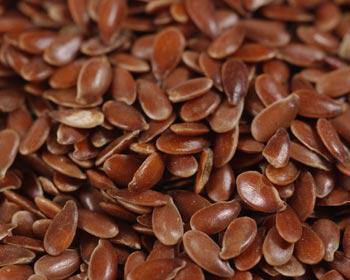 Flax seeds were first cultivated in ancient Egyptian and Ethiopian civilizations, partly because of their tremendous dietary benefits. Nowadays, nutrition experts recommend consuming two to four tablespoons of flax daily for disease prevention, weight loss and overall health.
Flax seeds were first cultivated in ancient Egyptian and Ethiopian civilizations, partly because of their tremendous dietary benefits. Nowadays, nutrition experts recommend consuming two to four tablespoons of flax daily for disease prevention, weight loss and overall health.
Extensive studies have shown that if you eat flax daily, you may possibly prevent or lessen the severity of some of today’s most common bodily ailments.
• Daily flax consumption coupled with a well-balanced diet and proper exercise helps to lower high cholesterol levels, especially in women.
• Flax seeds are believed to assist in the prevention of diabetes. The high concentration of Omega-3 fatty acids found in flax seeds may help to stabilize sugar levels in the blood.
• Omega-3 fatty acids are also natural anti-inflammatory agents that have been shown to greatly reduce inflammatory diseases like rheumatoid arthritis.
• Lignans are chemicals in flax seeds that function as antioxidants, which play an important role in the prevention of breast, colon and prostate cancers.
• The high fiber in flax seeds aid in weight loss regimens and are necessary for overall colon health. The fiber found in flax seeds readily absorbs water, which necessarily helps to soften stool to facilitate regular elimination.
• Flax seeds contain phytoestrogens, which are estrogen-like compounds that help to naturally relieve menopausal symptoms like hot flashes, night sweats and irritability by stabilizing your body’s hormone levels.
• Flax seed chemical compounds like lignans and ALA (alpha-linolenic acid) work to fortify your body’s immunity against common illnesses, such as colds and viral infections.
Flax seeds are typically ground and strained to produce oil, which can be found at your neighborhood health or drug stores. The seeds can also be roasted and then powdered. Since flax seeds possess a natural spicy flavor, adding flax powder to meals gives foods like soups, rice and salads a pleasant but mild aromatic flavor.
Flax seed oil can be added to stews, used in sautés or cooked as a fat. Because flax seeds are grains that are high in dietary fiber, they are an ideal ingredient for nutritious breads. It is recommended that, as with any high-fiber diet, you should drink ample amounts of water regularly.

